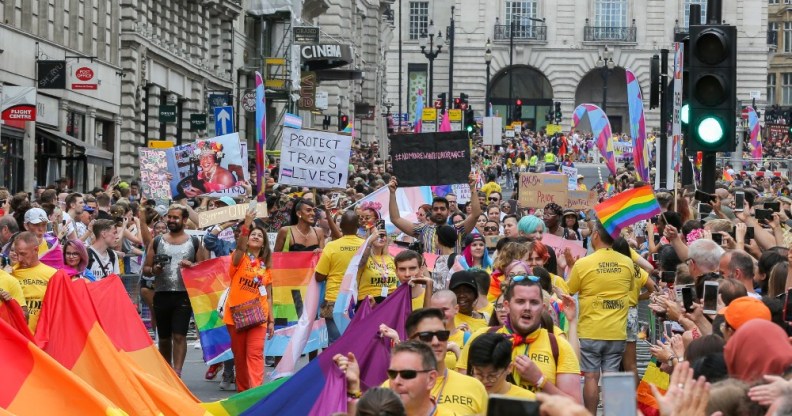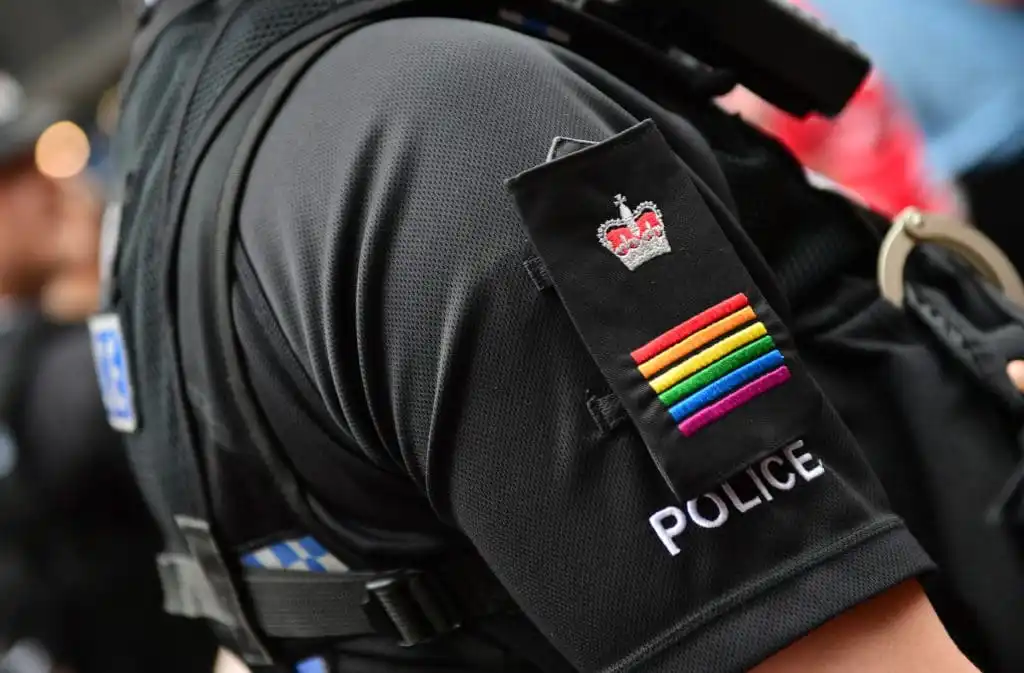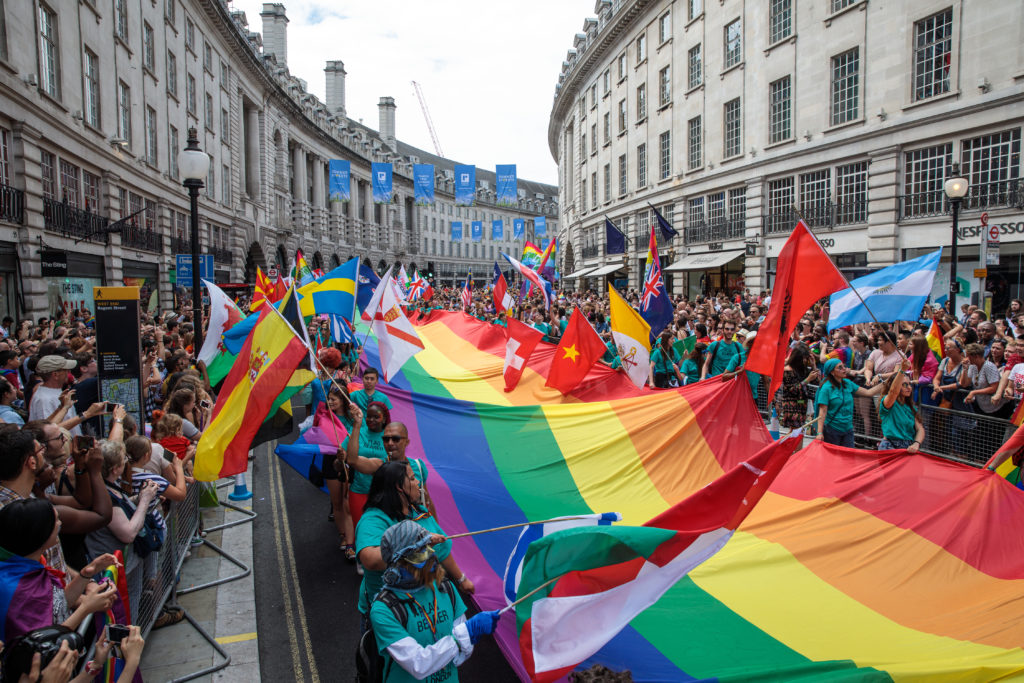Entire Pride of London advisory board quits and demands Sadiq Khan investigate ‘hostile environment’

Huge crowds gathered for Pride in London in 2019. (Dinendra Haria/ SOPA Images/LightRocket/ Getty)
Every member of Pride in London’s community advisory board resigned Thursday morning (18 March) in protest against the “widespread hostility” towards Black and brown volunteers that is “seeped” into the organisation’s culture.
The board, established in 2012 as an advisory and scrutiny body, consisted of 10 members – all of whom have now left their voluntary posts.
In explosively resigning in unison, outgoing board members called on Pride in London to hand over to new leadership while urging the mayor’s office to investigate allegations of bullying.
“We no longer have confidence that the current board of directors are the right people to continue leading the Pride movement in London and call for a new leadership to take the organisation forward,” their resignation letter states.
“The CAB also calls for an independent investigation by the mayor’s office into the alarming accounts of marginalisation and bullying of volunteers, with publication of the outcome.”
As top advisors told PinkNews, Pride in London’s leadership repeatedly dismissed or sought to downplay the board’s recommendations, many on how the organisation could better serve LGBT+ people of colour, whether they be Pride-goers or volunteers.
Those at the top of Pride in London have seemingly been “unwilling” to “meaningfully engage” with the issues raised by the board, they claimed.
And in the wake of the non-profit’s most senior Black staffer, Rhammel Afflick, resigning from his post as director of communications, board members came to a simple agreement: “Enough is enough.”
The board’s former chair and BAME representative, Ozzy Amir, explained to PinkNews how Pride in London under its current leadership is “irredeemable”.
Amir alleged that he encountered a “racist comment” from one senior volunteer, touching off of concerns that high-level staff have “contributed to a toxic culture”.
“Some of these allegations directly implicate members of the Pride in London board as contributing to this hostile environment and raise troubling allegations about your failure to respond to complaints on racism and bullying,” the letter says.
Facing off against a leadership team that “doesn’t care” about Black or brown voices ultimately made working at the body “untenable”, Amir said.
“We had no other choice.”
It’s an ‘open secret that Pride in London doesn’t care about Black voices’, says ex-adviser
The “breaking points” for board members were many, Amir described.
But feelings of frustration had simmered for weeks since February, when Pride in London rejected the board’s call to ban the Metropolitan Police Service from marching in the main parade.
The recommendation was the upshot of a sprawling weeks-long community outreach campaign by the board which asked for feedback on how to reform the event in the wake of Black Lives Matter.
Indeed, as protests against racial injustice shuddered throughout Britain, LGBT+ people wrote hundreds of letters urging Pride in London to exclude the Met’s queer staff group.

A police officer wearing rainbow epaulettes at Pride in London. (Chris J Ratcliffe/Getty)
Amir, who was elected as chair of the advisory board in 2018, said that the group presented their findings and advice to directors in November 2020.
“We were unequivocal in our advice, we were very, very clear about what we felt was the right course of action,” he said, “when taking into account community feedback that centres Black and POC voices and experiences, especially.”
Yet, after taking it to a vote, “Pride in London took the decision they did, which we felt went against their stated values against the commitments they’ve already made in public.
“It wasn’t even specifically around this decision, either. It was this long-standing, almost like this open secret, that Pride in London doesn’t really care about Black and POC voices or experiences.”
As members summed up in the letter: “Pride in London did not uphold its public commitment when it mattered most and failed to set even the most basic conditions on continued police involvement – like an acknowledgement of institutional racism.”
‘Hostile culture’ against queer people of colour is ‘widespread’ in Pride in London
Amir’s “first experience of racism” with Pride in London, he alleged, was at an event not affiliated with the group itself. A “senior volunteer made a comment on my skin colour […] in front of quite a few people”.
“That someone felt like they could make a racist comment like that so casually definitely was the first red flag. But I ignored it and carried on.”
In another alleged incident, advisers raised alarms over the diversity of a decision-making panel on community funds. They were told such a concern is “insidious”, Amir alleged.
He soon came to realise the problems he encountered were in no way “unique” to him.
“Learning how widespread this hostile culture was and just how many other people were experiencing the same, if not worse, treatment, that was when I knew as a brown man in a visible position I couldn’t be party to this any longer.”
When the board did highlight grievances and wilted morale felt among Black and brown volunteers, directors seemingly readied their regular wrap on race, Amir said.
Bosses reportedly “minimised” some issues or pointed at “exit interviews”, among other things, to show they “make every effort”. It was “disappointing”, he said.
“It just sounded like a pre-prepared statement that when we didn’t believe there was any meaningful engagement with the issues that we were raising, or willingness to even acknowledge them as real issues,” Amir added.
“And what’s really sad is that it’s taken people speaking about their experiences in the public eye for Pride in London to take it seriously.”
‘We acknowledge that we need to rebuild trust with Black communities’
In the board’s joint resignation letter, members described a culture of racism towards Black and brown volunteers. Senior staffers, the letter states, have “contributed to a toxic culture which erases and marginalises Black and POC voices”.
Included in the outgoing board’s list of suggestions, establishing an anonymous complaints procedure “outside the direct influence of directors” to flag bullying.
“In multiple annual reports, the CAB has raised serious concerns as to the absence of any formal complaints procedure available. Despite this, [Pride in London] failed to act.
“Without an anonymous process to report bullying or raise concerns, the most vulnerable and marginalised volunteers remain unprotected in a hostile culture.
“Contributing to this hostile environment, is the increasing preoccupation at Pride in London with managing the public relations concerns of its leadership, at the cost of supporting its Black and POC volunteers or community members,” the letter continues.
“The CAB believes Pride in London has reneged on its support of Black Lives Matter and its commitments to ‘listen to, advocate for and platform Black LGBT+ people’.”

Pride in London parade in 2017. (Jack Taylor/Getty)
Looking forward, a sense of hope for Amir and his fellow former colleagues.
He stressed that today is not about him or any board member specifically, neither was Wednesday about Afflick. “It’s a wider culture thing”, he said, one that can be changed.
To Amir, Pride is about authenticity, and it’s the duty of Pride in London – whether it be bosses or rank-and-file volunteers – to embody that.
“Authenticity isn’t always clean, it’s sometimes it’s messy, sometimes it’s difficult,” Amir beamed.
“Sometimes it involves making difficult choices and it means sticking to your values.”
A spokesperson for the mayor of London, Sadiq Khan, told The Guardian: “The mayor is committed to tackling racism and inequality in all its forms, and takes any allegations of this nature extremely seriously.”
A Pride in London spokesperson said: “We take concerns around bullying very seriously and have a number of processes in place for our volunteers to be able to lodge formal complaints, including anonymously, which are then followed up on and investigated.
“We acknowledge that we need to rebuild trust with Black communities and people of colour, and to that end we are conducting a full review of our processes and procedures at board level in order to bring about tangible and meaningful change. We will share more on these decisions within the next week.”

